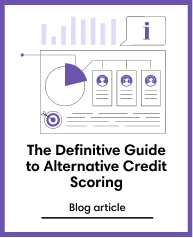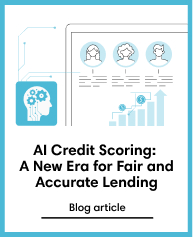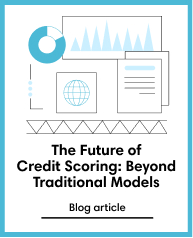Credit Scoring
Aug 11, 2021
What is a Credit Score and Why It Matters
Subscribe to our newsletter
Ever wondered: what is a credit score and why does it play such a crucial role in your financial life?
A credit score is a numerical representation of your creditworthiness, used by banks and financial institutions to assess how likely you are to repay borrowed money.
The meaning of credit scores lies in their role as a key measure of financial reliability. Credit scores enable access to credit and act as the yardstick by which companies evaluate the quality of financial products and services they offer to clients.
A good score helps secure favourable deals on car loans, credit cards, phone plans, or insurance. Conversely, a poor rating can lead to higher costs or being denied financial products altogether.
What is Considered a Good Credit Score?
To understand what a credit score is, it helps to know that it typically ranges between 300 and 900, depending on the model used. In India, a score of 750 or above is generally considered strong, enabling borrowers to access credit more easily, secure lower interest rates, and receive faster loan approvals.
Understanding what is considered a good credit score is vital because it directly influences your ability to access loans, rent housing, or even obtain insurance. A higher score signals reliability, while lower scores may result in higher interest rates or limited credit options.
Simply put, this three-digit number determines why your credit score matters; it’s your financial reputation in a single figure.
How Does Traditional Credit Scoring Work and How Is It Calculated?
To understand what a credit score is, it helps to know how traditional systems assess it.
Traditional credit scoring models, such as FICO, used by major credit bureaus like Experian, Equifax, and TransUnion evaluate financial behaviour across five key factors:
- Payment History: The most important factor. Making payments on time boosts your score, while missed or late payments lower it.
- Credit Utilisation: This refers to how much of your available credit you use. Experts from Experian recommend keeping utilisation below 30% for a healthy score.
- Length of Credit History: Older accounts strengthen your score as they demonstrate long-term reliability.
- Types of Credit: A balanced mix of revolving credit (credit cards) and instalment loans (like car or home loans) shows responsible borrowing.
- Recent Credit Activity: Opening too many new accounts in a short time can hurt your score, as it suggests a higher risk.
These elements together explain how credit scores are calculated and why maintaining consistency and discipline in financial behaviour is essential when learning how to build your credit score.
Limits of Traditional Scoring & Who Gets Excluded
While effective for borrowers with formal financial histories, traditional credit scoring often excludes millions. It relies solely on data from banks and registered lenders, leaving out gig workers, students, new immigrants, and the unbanked.
As a result, many creditworthy individuals face rejection or higher rates, despite strong repayment potential. This is where an alternative credit score comes in, using behavioural and device-based data to measure reliability.
Expanding beyond traditional models ensures greater inclusion and fairness for those previously overlooked, redefining the concept of what is credit and its real-world meaning.
Alternative Scoring: A More Inclusive Rating Method
Alternative credit scoring arises from the need to include individuals who are creditworthy, but who, for various reasons - for example, age or because they prefer to use cash - are unbanked and therefore not rated.
Unlike traditional data, an alternative credit score includes new data sources related to people's behaviours, such as rental payments and subscriptions, online purchases, and social network behaviours, among others.
Furthermore, alternative credit scoring uses artificial intelligence to process this data and generate prediction models that are more accurate than traditional sources.
In recent years, this type of credit rating has become increasingly popular due to the benefits it brings to both the client and the lender:
Greater Market Reach
Alternative credit analysis offers a new market for companies eager to provide their product or service to people who are not yet in the system. These people can now be evaluated based on their payment discipline and behaviour, increasing the client base.
Improved Customer Experience
Through automated alternative credit rating processes, companies can minimise the costs of acquiring a customer and thus reduce rates, making these accessible to prospects.
Better Offers For Clients
Currently, applicants who receive approvals for loans or services based on past credit information may be subject to higher fees since insufficient information results in low credit scores, and thus, companies rate these prospects as high-risk clients.
But with alternative credit scoring with real-time data, these prospects have the opportunity to get better deals.
In short, the future looks more promising for potential borrowers. Alternative scoring helps break the vicious exclusion circle, giving people the possibility of accessing a system that can significantly increase their possibilities.
Likewise, it allows companies to access new markets and present better offers, reducing risk and making informed decisions.
How to Build Your Credit Score
Ever wondered how credit scores are calculated? Building a strong score requires consistent financial discipline, awareness, and responsible credit habits.
Whether you are new to credit or rebuilding, here are proven steps to strengthen your profile and understand how to build your credit score effectively:
- Pay in full and on time: Payment history has the highest impact. Always clear bills and EMIs before the due date to show reliability.
- Track your credit limits: Monitor your card limits and spending to avoid unintentional overspending.
- Maintain low credit utilisation: Use less than 30% of your total limit to show lenders you manage credit responsibly.
- Keep old accounts open: Older accounts add to the length of your credit history, improving stability.
- Add positive credit data: Regularly use small credit lines or secured cards to build a record of timely payments.
- Check reports regularly: Review your credit reports from major bureaus to correct errors or fraudulent activity early.
Understanding what is credit and why is credit important goes hand-in-hand with managing it well.
Consistent discipline not only improves your score but also enhances access to better rates and financial opportunities.
Why Your Credit Score Matters
Your credit score represents your financial trustworthiness, essentially the meaning of credit scores in everyday life. It explains why credit is important for gaining access to loans, favourable interest rates, and broader financial opportunities.
A good score ensures smoother loan approvals, better credit card offers, and lower insurance premiums. On the other hand, a poor score can limit access or increase borrowing costs.
Whether you’re applying for a home loan or starting a business, lenders view your credit score as proof of financial responsibility.
As the market evolves, alternative credit scoring models now combine traditional data with behavioural and digital insights, offering fairer access for more people.
In short, what is a credit score and what is a good credit score today depends not just on history, but on how consistently you manage financial behaviour across both traditional and modern systems.
FAQs
Why Do I Have Different Credit Scores?
Different credit bureaus use unique scoring models and data sources, which can lead to variations in credit scores.
How Are Credit Scores Calculated?
They’re based on payment history, credit utilisation, length of history, credit mix, and recent activity.
What Is a Good Credit Score?
Typically, a score above 750 is considered good and improves your chances of approval.
Why Are Credit Scores Important?
They determine eligibility, interest rates, and borrowing terms for loans and credit cards.
What Factors Impact My Credit Score?
Late payments, high utilisation, and multiple hard inquiries can lower your score.
What Data Sources Are Used in Alternative Credit Scoring?
Alternative models analyse behavioural, transactional, and device metadata instead of relying solely on bank data.
How Can I Improve My Credit Score Quickly?
Pay dues on time, reduce utilisation, and avoid applying for too many new accounts.
How Rare Is an 800 Credit Score?
It’s uncommon; less than 20% of consumers achieve it, reflecting near-perfect financial behaviour.
What Habits Build a High Credit Score?
Timely payments, long-standing accounts, and consistent low utilisation build a high credit score.
Does Income Affect Credit Score?
Not directly, but a higher income helps manage debts more effectively and avoid missed payments.
Is a 900 Credit Score Possible?
Yes, but it’s rare, achieved only through consistent on-time payments and minimal debt usage.





